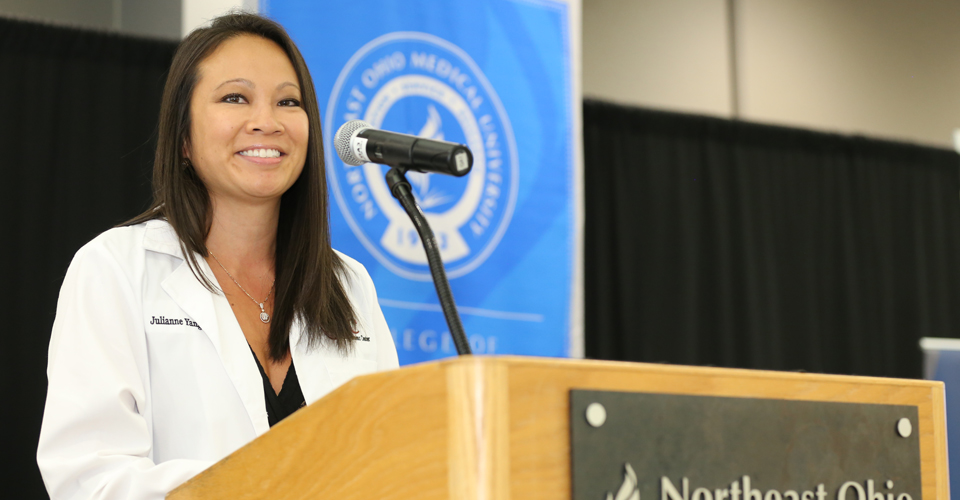Recipients of NEOMED’s 2018 Excellence in Resident Teaching Awards, presented at the Student Clinician’s Ceremony Friday, July 27, were asked to reflect on the challenges and imperatives of providing humanistic care to patients. They left event attendees with some uplifting comments, excerpted below.
Gold Humanism Honor Society member and fourth-year College of Medicine student Lillian Hetson led the event, which honored Daniel Wasdahl, M.D., associate professor of pathology, and Julie Aultman, Ph.D., director of the bioethics certificate program and professor of family and community medicine, with M2 Teacher of the Year Awards. Susan Nofziger, M.D., clinical associate professor of pediatrics and pediatric student clerkship director, was the keynote speaker.
Excellence in Resident Teaching Award recipient comments, below, have been paraphrased and edited for length.
I’m going to get real with you: Fake it till you make it. Residents don’t want to teach a wallflower. Ask questions. Be a thrill seeker. Be respectful. Stick together. If a patient is defensive, it’s because they have a back story. —Julianne Yang, M.D. (’14), obstetrics and gynecology, Aultman Hospital, Canton
When my uncle was hospitalized with Parkinson’s disease, he saw new faces in his room every day but one resident took extra time with him. My mother said, “Remember to invest and engage in all you do and the rest will fall into place.” Today, compassionate care is the best part of what I do. —Stefanie Delvecchio, M.D., family medicine, Summa Health Barberton Hospital
The challenge comes when you’re on your 15th patient of the day and the descriptions start to sound routine, whether it’s abdominal pain or chest pain or dizziness. If it disengages you from your patient’s it’s bad. You need to convey empathy. Try to elicit information by making statements to patients, instead of interrogating them. Try “I’m curious about your day,” instead of “How was your day?” –Daniel Hinds, D.O., emergency medicine, Mercy Health-St. Elizabeth Boardman Hospital
When you’re entering a patient’s room, try to humble yourself at the door. You’re not the most important person in the room. —Brandon Smith, M.D. (’17), general surgery, Summa Health, Akron
“We teach not just by formal lectures and bedside rounds but by acting as role models in how to treat each other, ancillary staff, patients, and families. At times, these tasks may seem difficult or even impossible, like after a 24-hour shift or at 3 a.m. on a busy shift, but try always to remember the impact you have on medical students and strive to be that role model resident.” —Dylan Timberlake, M.D. (’15), pediatrics, Akron Children’s Hospital (written remarks, read in his absence)
Humility, intellectual curiosity, desire to maintain high standards of professional behavior: These are all qualities of those who overcome challenges to provide humanistic care. —Kellen Welch, M.D. (’14), General surgery, Summa Health, Akron
